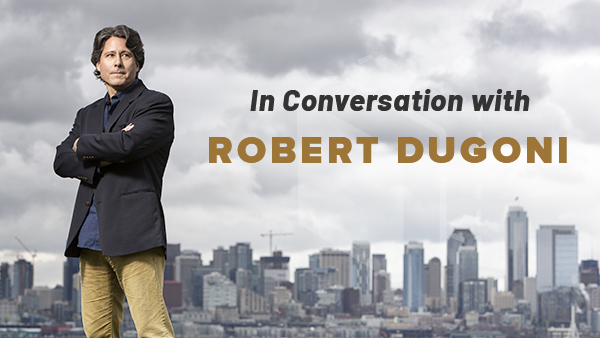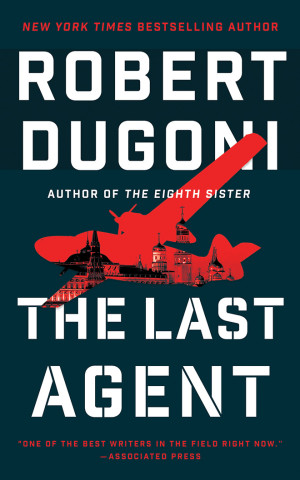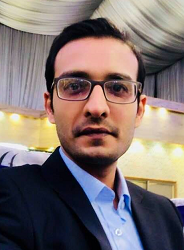
In Conversation with Robert Dugoni
Robert Dugoni is the critically acclaimed New York Times, Wall Street Journal, and Amazon bestselling author of the Tracy Crosswhite series, the Charles Jenkins Series, and the David Sloane series.
Robert Dugoni’s books are sold in more than twenty-five countries and have been translated into more than two dozen languages. Since 2013, Dugoni has sold more than six million books. Two of his books, My Sister’s Grave and The Eighth Sister have been optioned for television series development.
The Extraordinary Life of Sam Hell is a literary-fiction novel that showcases Dugoni's versatility as an author — a gentle coming-of-age story that our book club loved reading this month. We also had the pleasure of hosting Robert Dugoni for an exclusive Ask Me Anything during which he reflected on his writing career, told us about his latest work, and shared invaluable writing advice for new writers.
Here is the unabridged transcript of the event:
Q: Question by a community member
C: Comment by a community member
Q: During our book club discussion this month we discussed how what happened to Bateman and the story not leading up to a trial was a sort of Deus Ex Machina. We were curious to find out your intention behind that and what message you wanted to convey to the readers?
Robert Dugoni: First, I wanted to show that bullying is a learned trait by most children. Often children who become bullies are bullied at home. Second I wanted to create a situation where Sam generally believed he was standing up to the bully and doing something positive for the wife. He was not going to be intimidated by David Bateman.
And then, Bateman kills himself and his wife and Sam believes he is responsible. He is the cause. The story is about Sam wanting to believe. Wanting to believe that God gave him extraordinary eyes because he was going to lead an extraordinary life, but there are so many obstacles in that path, and Bateman is a very large one. This is another instance where Sam decides he no longer believes.
Q: I listened to The Extraordinary Life of Sam Hell on audible, which you narrated yourself. I was wondering if that requires some kind of training and if you narrate all your audiobooks yourself?
Robert Dugoni: Most of the narrators are trained actors, or voice over actors, but not always. I do have a theater background, but I don't consider myself a trained actor. I've never been asked to narrate the Tracy Crosswhite books since I'm not a woman. I was asked to narrate the Charles Jenkins espionage series but I declined. The book contains Russian accents and the Russian language and I wanted someone with that skill. I was fortunate to get Antonio Banderini (sp) and he is superb.
Q: I read somewhere that you finished the first draft for The Extraordinary Life of Sam Hell in just 5 weeks, is that true!?
Robert Dugoni: I did finish the first draft in five weeks, but it wasn't a very good draft. It was one of those stories that came to me and wouldn't go away. Scene after scene just jumped into my head and at times I felt like I was just transcribing it. But I didn't know what Sam wanted, so the story sat for a long while until I realized Sam wanted to believe. He wanted to believe his mother when she told him he was put here for a reason. Once that information came to me, I could finish a novel with a purpose.
Q: Your main writing genre has always been thrillers and crime stories. The Extraordinary Life of Sam Hell is different. Was it something you always wanted to write?
Robert Dugoni: I grew up with a mother who was an English major and so she had all these classic books like The Great Gatsby and The Count of Monte Cristo and the Old Man and the Sea and that's what I grew up reading. I always thought those were the stories I would write, but things happen in our lives and I was in Law School when John Grisham and Scott Turow hit the bookshelves and that seemed like the easier path to publication. I learned there is no easier path.
Q: I listened to an interview in which you mentioned that you did a lot of research into police procedures and investigation techniques for your Tracy Crosswhite series. It made me curious to find out how you did your research for the Charles Jenkins series, with the world of espionage being so incredibly secretive?
Robert Dugoni: First, I was fortunate to have traveled to Russia for three weeks, with a lot of time in Moscow and St. Petersburg, so I got a good strong flavor of the country, and really the people.
Second, while the story is fiction, I did have a former intelligence officer approach me about a trial in which he was exonerated for espionage. I said I wouldn't write his story but I was interested in writing an espionage story and bringing back Charles Jenkins. He agreed to help. Along the way, I met two former CIA officers and they too offered their help. So I've been blessed with great research tools.
I've also read about twenty books on the subject. The problem is none of those books are current because the intelligence community vets former officer books to make sure they aren't giving away anything.
Q: For The Extraordinary Life of Sam Hell, I think you drew on your own childhood and experiences to write about Sam’s life. I was wondering how you wrote from the perspective of a female detective in Tracy Crosswhite or an African American ex-CIA agent in Charles Jenkins?
Robert Dugoni: I get asked that question a lot and the honest answer is I never try to write from the perspective of a woman or of an African American man. I think that would be fatal. I write from the perspective of human beings who have been injured in their path and are just trying to forge forward with a life for themselves and those they love. They want to be respected in their jobs and respected at home. I think those are universal truths that transcend race and gender. I have sold the Charles Jenkins series to Los Angeles and I have requested an African American screenwriter to adapt the books.
Q: Which one of your books did your children enjoy reading the most?
Robert Dugoni: They were both emotionally touched by Sam Hell. At the same time, my son has become a huge reader and he loved The Last Agent, my most recent and My Sister's Grave. As a father, it is special to have your children take an interest in your writing and try to figure out what is going to happen in the novel. It's made for some fun evenings.
Q: Do you teach writing courses?
Robert Dugoni: I do teach. I started about 15 years ago when I was asked to teach writing to lawyers and doctors who wanted to write novels. As a lawyer, I prepared like crazy and now I have very large binders on different subjects.
A friend and I started a writing seminar called The Novel Writing Intensive. It's three days of intensive instruction and critique with just 12 students. I've had a lot of fun meeting people from all over the world and helping them get published, or just polishing their story.
Q: For new writers, is writing short stories initially a good place to start before taking on a full-length novel?
Robert Dugoni: Short stories are great because they get you writing. Anything that gets you reading and writing helps because writing takes years to improve. I'm always striving to get better. I think studying the craft of writing a novel is really the key to understanding what you're doing and why. I studied Chris Vogler's book The Writer's Journey and learned the hero's journey. So when I tap into the must and get writing, I can be open, but also know where my characters need to go.
Q: Which one of your books was the first to top bestseller charts and how did that success impact or change your life and career?
Robert Dugoni: The Jury Master hit the New York Times and stayed there for three weeks, but the book that changed my life and my family's lives was My Sister's Grave. That was the book that really expanded my reading audience around the world and put me on the map. Once people found it, they went back and found my other novels and they've stayed with me throughout my career. I believe there is a bond between author and reader and I try to honor that bond with every book I put out into the market.
Q: You often have 2 to 3 books coming out in a year, which is quite impressive. What’s your writing schedule like?
Robert Dugoni: I write just about every day. Now that I'm older, I do try to take time to enjoy my wife and my kids and I've taken up golf, which is an obsession I'm finding, but I do write at least 5 days a week and if I'm on a roll, I write every day. I love what I do and I'm blessed to be able to do it every day.
Q: What was the most unexpected or surprising thing you learned about the craft of writing?
Robert Dugoni: The most surprising thing is there is a format to writing a novel, just like writing a news story, a short story, or a college essay. People have been telling stories in novel-length the same way for hundreds of years. What makes your story unique is the settings and the characters. Get readers to fall in love with your character and they will follow them.
Q: The one thing that grabbed my attention in The Extraordinary Life of Sam Hell is that the antagonists aren’t one dimensional, instead, they’re all battling their own demons, which helped me empathize with them and not just with Sam. Is that something that you try to do with all your antagonists?
Robert Dugoni: Absolutely. Antagonists are people. Unless you are writing a psychopath (only about 4% of the population) or a sociopath (also a small percentage). Most people are not evil at their core. They are fighting personal demons. I had a grandfather who was an alcoholic, but my mother loved her father and that was the most difficult thing for her, I think. She loved him so much and couldn't understand why he disappointed her so much. David Bateman is battling his own demons, but his wife must have seen some good in him, and he had a beautiful little girl.
Q: Where do you get ideas for new stories?
Robert Dugoni: Sometimes the idea will come from a news story I read and adapt, but sometimes they just come... I have a second literary novel coming out next September that is called (for now) The World Played Chess and it's about an 18-year-old young man who graduates high school and just wants to enjoy his summer and he goes to work on a two-man construction crew and the two men are Vietnam veterans. This was 1979 and happened to me. The story is fiction, but something about my experiences helped me to find it.
Q: I am sure you are asked this question often. But as someone who loves thrillers, I have to ask, how do you manage to maintain the individuality of each story?
Robert Dugoni: That's hard, especially the more you write in a story. I think your stories need to develop over time. So your character needs to age. His or her colleagues need to age. His or her spouse and children need to age. It is that process that opens the door to new issues and problems.
For instance, I am not the man at 60 that I was at 20 or 40. I'm a father now with a wife and two kids. That presents its own challenges and rewards. I've suffered a stroke, learned I needed a heart patch, and have had one hip replaced. Those things bring perspective to us, and in that change of perspective, the character also changes.
Q: Who are some of your favorite authors and your favorite novels?
Robert Dugoni: I loved Pat Conroy's ability to tell a personal story. I also love Stephen King's more recent stuff like The Green Mile and The Shawshank Redemption. But I read everything. Every genre and all kinds of authors. I'm asked to blurb a lot of novels and I do my best, so that takes up a lot of my reading time.
Q: You’ve had a career as a lawyer before becoming a full-time novelist - has that influenced or helped your writing in a big way? At what point did you decide to give up practicing law and turn to writing full-time?
Robert Dugoni: I always wanted to write. I became a lawyer because my family are all compulsive overachievers. Law taught me discipline and taught me what it means to work hard. I didn't turn to full time writing until after My Sister's Grave hit and I knew I could support my family. That's a tough decision for any writer. It can cause stress, and stress can cause problems in writing. I feel blessed that I have the ability to do this full time, thanks to people like you and other readers out there.
Q: Who chooses the title names for your novels?
Robert Dugoni: A few of the titles, like Sam Hell and The Eighth Sister have been mine. Otherwise now the Amazon Marketing team chooses the title. I really like "The World Played Chess" because it's based on that saying, 'the world played chess while I played checkers'. But we'll see if it sticks or not. 🙂
Q: Many of your books have topped bestseller charts. Which book, if you had to pick one, are you the proudest of?
Robert Dugoni: The Extraordinary Life of Sam Hell. As I wrote that novel, I felt I had to find the courage to write from my heart, not from my head. That's a scary proposition because it means you're putting your heart out there in the public and it can get hurt, trampled on, and picked over, but a writer needs to find that place where they can put their heart into their novel so those who read it can put their hearts in it also. I think that's why Sam resonated with so many people.
Q: I had a question about the latest book, The Last Agent. Can someone get into it without reading The Eighth Sister first?
Robert Dugoni: My books are always self-contained. That means the story is complete, so people don't have to buy the earlier books to know what is going on. That said, it always helps to read the prior novels in a series to get an understanding of why the character is, emotionally, where he is in that novel.
Q: Who would be your favorite actors to play the role of Tracy Crosswhite and Charles Jenkins?
Robert Dugoni: Tracy Crosswhite - probably Charlize Theron because she has a lot of depth. But others have made suggestions that seemed to fit just as well. Charles Jenkins I'd choose Idris Elba. Maybe Chiwetel Ejiofor. Hard to believe Idris Elba was on the Office for a short while, isn't it?
And I'd love to see Matt Damon play Matt Lemore but it's probably too small a role for an actor of his standing.
Q: What’s a message you’d give to young and aspiring writers?
Robert Dugoni: Learn the craft. Study the Hero's Journey and really understand it. It will save you years of heartache and pain. Don't be stubborn. The art is not in your plotting. It is in your characters and their interactions with one another.
Let me just say that this was a lot of fun and I hope to see you all at conferences again soon. I was invited to conferences In India, Paris, and Italy as well as all over the United States and they were cancelled. I hope you all remain safe and healthy and we can get through this time in history soon. My best to you all.
Remember, the best way to learn anything is to flex those muscles. So read and write!
Buy Robert Dugoni's latest book The Last Agent (Charles Jenkins Book # 2)

Join the What Should I Read Next Community to be part of future events with authors here

Popular Blog Posts
A conversation with Marjan Kamali
New Year, New Book, New AMA
A conversation with Rachel Joyce
December Book Club and AMA with Rachel Joyce
Ask Me Anything
Each month there is a live monthly Q&A with a wide range of interesting authors. This is your opportunity to understand your favourite books on a much more personal level.
View Upcoming AMAs